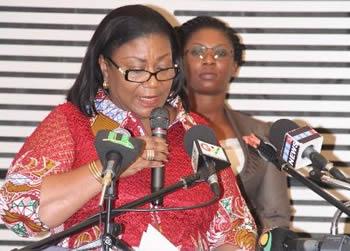African conference on emerging infectious diseases and biosecurity opens
 The First Lady, Mrs Rebecca Akufo-Addo, on Wednesday encouraged African scientists and other stakeholders to work together to find permanent solutions to the Continent’s growing health challenges.
The First Lady, Mrs Rebecca Akufo-Addo, on Wednesday encouraged African scientists and other stakeholders to work together to find permanent solutions to the Continent’s growing health challenges.
She said although the “rest of the world may come to our aid,” there was no doubt that with the high calibre of brilliant minds within the Continent, it would be able to generate solutions to address its own unique health challenges, particularly, the upsurge in emerging infectious diseases such as the Ebola Virus disease.
She said even though Ghana did not record a single case of the Ebola Virus Disease, it was expected that some valuable lessons would be learnt from countries that experienced the brunt of the epidemic.
Mrs Akufo-Addo was speaking at the opening of the Third African Conference on Emerging Infectious Diseases and Biosecurity, being hosted by the Noguchi Memorial Institute for Medical Research in Accra.
The three-day conference, on the theme: “Pandemic Preparedness: Biosecurity and Infrastructure in the wake of Ebola Outbreak,” would provide a platform for African scientists in particular, and their counterparts who are from across the globe, to discuss and strategise on how to prepare in case of a pandemic, learning on the devastating lessons of the West African Ebola outbreak in 2013.
The annual conferences were, however, initiated by the Global Emerging Pathogens Treatment (GET) Consortium, to address and define response mechanisms to biological threats and increasing incidences of emerging infectious diseases on the African Continent.
Mrs Akufo-Addo said Africa was challenged with inadequate health facilities and shortage of human resources in medical and allied sciences, experienced perennial political instability, grappled with challenges related to food insecurity, nutrition, health care, poor economic performance and energy crisis among other things.
“Obviously, these dynamics pose a challenge to our capacity to deal with infectious diseases like Ebola, yellow fever, meningitis and Lassa fever among others.
“…And the situation had become more worrying when infectious diseases had increasingly become unusual in their magnitude, in the way they spread and combine with other problems in the environment to present even bigger challenges,” she said.
Mrs Akufo-Addo called for innovative ways of breaking new grounds, barriers and doing business and ensuring that effective technologies, products and services did, indeed, reach the millions of people who needed them.
She said the nation’s ability to create, acquire and utilise scientific and technological know-how was becoming widely acknowledged as a determinant to improve the quality of life of its people.
Mrs Akufo-Addo said such science, technology and innovation could be enhanced when various tools, skills, knowledge and financial resources were integrated to solve the challenges facing Africa.
She commended the GET Consortium and its partners for instituting the annual conferences to help address issues of Africa’s vulnerability to emerging infectious diseases and the biosecurity threat to communities, especially women and children, who are the most impacted by such events.
Professor Akin Abayomi, the Principal Investigator of the Global Emerging Pathogens Treatment Consortium, and Chairman of the Faculty of the Conference, called for the need to engage top scientists to prepare Africa for health emergencies and work with local communities to turn survivors into champions.
Africa, he said, currently lacked resilient health and political systems that protected its sovereignty, adding that threats could rise from both within and from outside, in multiple disguises, therefore there was the need to create much awareness and alert at all times.
He called for closer attention to biosecurity not only from a public health perspective with growing science and technology, but also from a national security viewpoint, where those biological agents had been adopted for potential warfare.
He said in this regard, researchers, policy makers and implementers working around highly virulent pathogens like Ebola and H1N1 needed to have the right perspective on biosecurity, which the conference had been providing.
Prof. Kwadwo Koram, the Immediate Past Director of the Noguchi Memorial Institute for Medical Research, said the Ebola epidemic served as an eye opener to Africa as far as its great deficiencies in its health sectors were concerned, and led to several scientific conferences and partnerships.
He said there was the need to sustain the momentum as Ebola might come back and, therefore, the need to generate further research, harmonise existing ones and disseminate them, and share insights and new lessons.
There is currently a science gap in Africa, which could be attributed to the lack of the necessary legislation and policies, as well as outdated ones that failed to correspond to modern disciplines and technology, crippling biosecurity.
Prof. Koram said these needed to be revised to match the current trend of global standards.
Source: GNA
